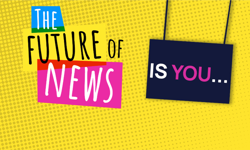It was recently the 50th anniversary of Computer Weekly. Front page stories on the first issue included the expected shipping date for some new IBM software, and a year later, they had a feature about computerised type-setting. I wasn’t just impressed that the title had lasted 50 years, but also that 50 years ago, someone had the courage to think there was going to be a market space for a title dedicated to the topic of business computing. It just goes to show that publishing has always existed in a space where businesses are expected to take risks with new technology and new editorial formats.
However, the interconnected web world and the accelerating trend for online advertising dollars to end up in the pockets of platforms like Facebook and Google have left publishers feeling under pressure like never before. Here are some of what I think are the critical issues facing publishing in the next year.
[SH]Messenger apps and chatbot services
I’ve been working in online publishing long enough to remember the slow march of design from tiny desktop screens to massive desktop screens, to then suddenly finding everybody was looking at their phones instead. All that time, people have been trying to deal with what is the right size ‘chunk’ of information. Messenger apps are just another iteration of that challenge.
We know that people love spending time on platforms like WhatsApp and Facebook Messenger and Snapchat. What we don’t yet know is the best way to deliver content and information to them. Well, maybe not in ‘the west’.
Facebook debuted some chatbots from news providers early in 2016, and they are all (including the Guardian’s, which I’ve worked on) mostly a way of delivering push headline notifications to the user via a different avenue. There’s not a huge amount of chat.
Google’s Allo and Facebook’s M have joined Siri and Cortana in the ranks of things bidding to help you through life in a natural language interface, and there’s maybe a hint of how things might develop if we look at WeChat in China. It is a very evolved space, but it still looks a lot less like things that could pass the Turing Test, and a lot more like using phone menus and the computer command line.
I think there’s a good question about when is the right time for a publisher to be moving in as an early adopter on a platform. I don’t think these are going to deliver masses of value yet, but it feels like a space that could develop rapidly.
Voice controlled services
Amazon has launched Echo in the UK, after it had been successfully on the market in the US for some time. A smart speaker that sits in your home, you can ask Alexa to perform various tasks, from playing music on Spotify, to asking her for the latest headlines.
I say ‘her’ advisedly, because Amazon suggest that everything you deliver to the device should speak with ‘her’ personality. It’s a little bit like having the voice-controlled computer from Star Trek: The Next Generation in your front room, albeit slightly less inclined to be possessed by alien intelligences trying to take over the ship.
Again, like messenger bots, it feels like early days, and getting content to sound natural when being read out by a robot is a challenge. But there definitely seems to be something there that publishers need to think about.
The latest version of macOS incorporates Siri into desktop Macs for the first time, and while people of my generation are always going to think that controlling a computer with your voice is futuristic, for kids growing up today, it’s just a done deal and a thing that exists. Where will publishers fit into that landscape?
Facebook Live and other live streaming services
This year, Facebook gave live streaming video a big push. The numbers were fantastic, and a lot of publishers jumped straight on board - some with financial incentives from Facebook themselves.
Everybody seemed to be talking about the BuzzFeed video stream of putting elastic bands around a watermelon until it exploded, perhaps the first big break-out live-streaming viral hit. Not everybody was impressed. The NYT’s public editor wrote a scathing column criticising some of the paper’s efforts in this area.
Live streaming is not going to go away. Even if Facebook decide it isn’t the next big new thing after all, we can pretty much bank on a future of more people carrying more powerful phones with more bandwidth and better cameras. Potentially any news event worth being live streamed will be live streamed by the people involved.
This poses journalists and media companies with an ethical and moral challenge. Channel 4 News and the Washington Post decided to live stream the opening moves of the recent Iraqi and Kurdish offensive on Mosul, complete with flying thumbs up and laughing reaction emojis.
What are the rules that we are going to set up about the live streaming material we will produce ourselves as publishers, and the live streaming material we agree to carry?
We need to think carefully about the implications - if you start live-streaming local news from the site of a fire, are you likely to encourage more passers-by to come to gawp at it, endangering themselves? If your journalists are operating in the kind of situations likely to provide the most dramatic live streams, are they keeping themselves safe?
It seems like over the course of the last couple of decades, we watched broadcasters likes the BBC and Sky News come to grips with a move from producing moving images to producing text based news for the desktop computer and then phones. Now primarily text-based organisations are having to learn more about broadcast technology. There’s some good news there at least for publishers - a lot of the skills needed to successfully do live broadcast are already out there.
But live streaming on Facebook and other platforms like Periscope isn’t broadcast television. The instant audience feedback, while providing an ethical challenge, is also the thing that makes being live on the web so potentially transformational. Alibi TV, for example, tried an ambitious piece called Framed, where the audience were enlisted as part of the broadcast to try and solve a murder mystery in real-time. The producers used comments and reaction emojis to help guide the character through the situation. It’s clearly a fertile space to think about new forms of story-telling, and new ways of interacting with our audiences
What will publishing on Apple look like?
Apple has a track record of designing great hardware that people love to lavish cash on, but they haven’t always had the best track record of funnelling that cash back to publishers. And the iOS environment seems to have been one false step after another for traditional publishing content.
When iPads first came on the scene, having standalone magazine apps and facsimile editions was all the rage. Some early adopters threw in lots of extra interactive content. But they didn’t deliver huge subscriber numbers. Apple Newsstand was the next attempt, but with the latest version of iOS, that has bitten the dust.
Apple News is taking a more prominent role, especially on the phone where Spotlight search is directing people straight to Apple’s app rather than publishers’ own sites. It is going to take a while for publishers to see whether the benefit of all being bundled together under an Apple branded experience is one that pays off.
It’s the bottom line, stupid
But I think, overall, despite these potentially exciting new developments, it is boring old bean-counting that will continue to present the biggest strategic challenge over the next year.
I think the key question for every publisher is not so much where are we going to innovate and experiment, but what are we going to stop? What are we doing because we’ve always done it, but which isn’t bringing in either money or the audience?
It always strikes me that weekend newspapers got bigger and bigger in an arms race of extra print supplements that were fuelled by a demand for advertising space coupled with cheaper printing technology. Yet when advertising goes into a downtown, we all continue to produce the supplements because, hey, that’s what makes a weekend newspaper now.
And how does that translate digitally?
There are going to be some articles you produce because they are journalistically important and you don’t mind if they individually yield less than their production costs. But what percentage of your output is this? If you are covering events because you feel obliged to, but for which you are never going to really excel or base your reputation around, is it worth doing them? Could the money be better spent on making the things that you do rely on for your reputation even better?
How do you solve a problem like attention?
I think all of these points boil down to the one thing that publishers need to really focus on - attention. It’s not that attention is scarce - people pay attention to loads of things. It’s not that people have dumbed down - people have been complaining about dumbing down for ever.
But the effect of nearly every single person in the developed world having a connected computer in their pocket is that at any single moment of their day they could be doing a million other things which aren’t reading or watching or listening to what you have published. How do you get your editorial in that space?
And how do you think about the different service you are now providing? In the good old days, if you asked a journalist or editor what was the point of their business, they would tell you it was to provide a service to their audience - news, information, escape, entertainment. And then as an afterthought, they might remember they also provided a service to advertisers - getting them eyeballs for their adverts. If the last bit of that equation has changed, that Facebook and Google are the force getting the eyeballs, what does that mean about the way you approach the first part of your mission?
Good luck everybody. My hunch is we have to strap in for another roller-coaster year ahead.












